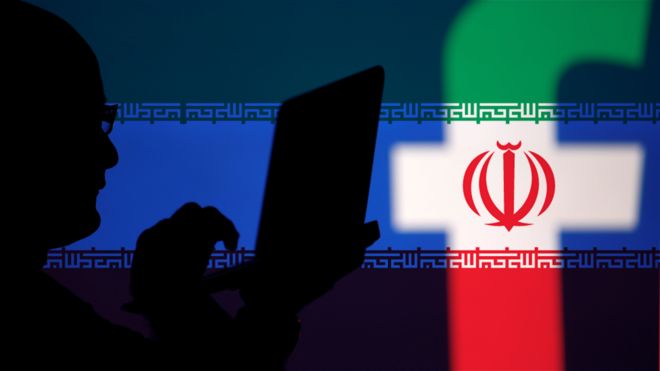
Facebook has uncovered and removed dozens of pages, accounts and groups linked to Iran that the firm says coordinated “inauthentic behaviour”, targeting people in the US and UK.
The affected posts focused on divisive topics such as race relations, opposition to President Donald Trump and immigration, it said.
The social network revealed that it uncovered the activity a week ago.
“We can’t say for sure who is responsible,” it said in a blog post.
It added that it had so far found no ties to the Iranian government but that its investigation was ongoing.
The company said it had identified 82 pages, groups and accounts that were coordinating inauthentic behaviour on Facebook and Instagram in violation of the platform’s policies.
Only two advertisements were connected to the effort, it said.
While the earliest signs of the activity date to June 2016, Facebook said much of the activity occurred over the last year.
Researchers at the Atlantic Council, which reviewed the behaviour, said many of the accounts masqueraded as American liberals.
Unlike a batch of Iranian propaganda Facebook identified in August, these messages appeared more varied, with anti-Israel and anti-Saudi Arabia commentary mixed in, it said.
“This evolution of tactics from previous more blatant pro-Iranian messaging suggests the operation had learned from earlier takedowns,” the council said.
The BBC asked the company how many people had seen the posts and pictures shared on the fake accounts, or clicked “attending” on the fake events. Facebook said it was not yet sure.
But the Atlantic Council said some of the pages won large followings. For example, the Facebook page I Need Justice Now had more than 13 million video views.
Overall, Facebook said more than a million people followed at least one of the 30 pages, while about 25,000 Facebook members had joined at least one of the three groups.
More than 28,000 people followed at least one of the 16 Instagram accounts.
The fake accounts had also created seven “events” on Facebook that people had indicated they would attend.
The disclosure comes just weeks before a hotly contested congressional election in the US and as the UK continues to debate Brexit, which has fuelled talk of challenges to Prime Minister Theresa May.
It follows action the firm took in August, in which it said it had removed hundreds of pages and groups, linked to both Iran and Russia, that had engaged in what the firm described as “misleading” activity.
Facebook has faced criticism for failing to be alert to the opportunities to use the platform for propaganda in previous elections.